By Lauren Janus
“I Voted” stickers. Image by Element 5
At times, this fall seems almost normal. The leaves are turning, plastic ghosts and spiders are everywhere, and pumpkin spice again abounds. This season always arrives with a crisp breeze of anticipation as those of us who work with donors and nonprofits approach November and December, when the vast majority of charitable giving occurs as part of the annual year-end giving tradition.
But of course, this year isn’t normal. Our country faces one of the most divisive and potentially destabilizing presidential elections in generations. In a few short days, we’ll face the outcome of this election and get a taste of how our country will move through the decision–whatever that decision is.
As we as a country charge headlong, hat pulled over ears, raincoat belted, into the political process, we at Phīla are increasingly asked—by clients, colleagues, and family members—how one’s giving should change, or not change, to meet these uncertain, deeply unequal, and often frightening times. Here are my answers:
Start by taking honest stock of your 2024 giving using an equity lens. The inequality in this country, and around the world, is deeply rooted in systems that favor certain groups and economic systems. Philanthropy is both a consequence of this inequality (people with more have more to give away) and one lever for righting the ship or creating more equal outcomes. But just like where you spend your money matters, where you give it matters as well.
The majority of our client engagements start with a clear-eyed, numbers-don’t-lie look at where the donor has been giving. It’s always an illuminating exercise. Inevitably, a donor will be shocked to know they are giving so much to certain issues and types of organizations (often large, well-known nonprofits) and so little to others.
To do this exercise yourself, set aside an hour or so to go through your gifts for the year. If you have a Donor Advised Fund, that’s an easy place to start. You can also go through your bank statements, email receipts or ask a partner or spouse what they remember. Don’t forget any political gifts and other non tax-exempt gifts you made! In our eyes, those absolutely count.
As you build your list of organizations and gift sizes, start to look for patterns and gaps. Are you giving substantial, regular gifts to large institutions like private universities and hospitals by default? What about organizations or political candidates your friends (i.e. people like you) recommended? If so, pause and take a moment to think about how these practices could reinforce the preponderance of gatekeeping in fundraising, thereby reinforcing inequitable funding patterns between White-led and BIPOC-led organizations.
Plan your year-end gifts and other philanthropic activities. If you’re like us, the political appeals have been coming fast and furiously to your inbox and text message screen. In a few short weeks, those appeals will be matched by any and every nonprofit you’ve ever given to asking for a year-end gift. When you take a moment to plan your giving, you stand less of a chance of reactively giving more to organizations that have the budget to send you gorgeous appeals. Take time now to think about any gaps revealed by your stock-taking in step one. Are there grassroots groups in your community you might support this year? Are there people outside of your social circle you could ask for lesser-known groups doing important work? Put them on your list.
At the same time, think more broadly about your year-end philanthropic activities. Are you hoping to get your charitable estate plan updated or address an inflection point in the life of your family foundation? Start thinking about those tasks now and reach out to a philanthropic advisor like Phīla, as well as any legal, financial or other professional advisor. We all get busy this time of year.
Set some goals for 2025. As you begin your holiday and other year-end activities, be sure to set aside some time to map out your giving for the new year. Now’s the time to sit down with family and communicate your giving goals for next year. Do you want to give more to community-based organizations (even if the community isn’t your own)? Can you afford to increase your giving budget for next year?
Talk with your spouse, children or others important to you about the gifts you know you’ll make and those that may feel unfamiliar but that you want to consider. Now’s also a good time to talk about where you want to show up in 2025 as a volunteer or even simply a dependable advocate.
Importantly, just because the election is over, now is not the time to stop making political gifts. Again and again we hear about democracy-building groups who fear the "post election drop-off" in funding. Many will have to lay off staff in January and some will close altogether. In fact, it's the time between elections when the groundwork is laid for success at the ballot box. Consider signing the "Election Day to Every Day Pledge" and continue to give (or even increase your giving) to organizations doing the hard work of registering voters, challenging unfair election laws and mobilizing communities for the next election.
These next few weeks will be nothing if not uncertain in our country. But as individual citizens, we can support our democracy and our communities by voting, by helping others to vote, and by being thoughtful, intentional and generous in our giving now and into the New Year.


